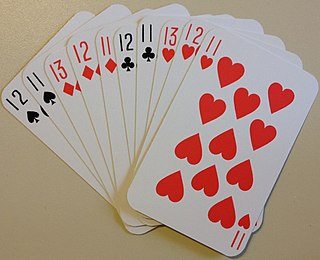
500 or Five Hundred is a trick-taking game developed in the United States from Euchre. Euchre was extended to a 10 card game with bidding and a Misere contract similar to Russian Preference, producing a good cut-throat three player game like Preference and a four player game played in partnerships like Whist which is the most popular modern form, although with special packs it can be played by up to six players.
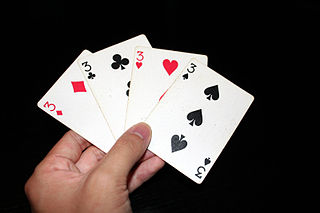
Gin rummy, or simply gin, is a two-player card game variant of rummy. It has enjoyed widespread popularity as both a social and a gambling game, especially during the mid twentieth century, and remains today one of the most widely-played two-player card games.

500 rum, also called pinochle rummy, Michigan rummy, Persian rummy, rummy 500 or 500 rummy, is a popular variant of rummy. The game of canasta and several other games are believed to have developed from this popular form of rummy. The distinctive feature of 500 rum is that each player scores the value of the sets or cards they meld. It may be played by 2 to 8 players, but it is best for 3 to 5.

Forty-fives is a trick-taking card game that originated in Ireland. The game is popular in many communities throughout Atlantic Canada as well as the Gaspé Coast in Québec. Forty-fives is also played in parts of Massachusetts and southern New Hampshire in New England, United States, as well as in the South Island of New Zealand.
Spite and Malice, also known as Cat and Mouse, is a relatively modern American card game for two or more players. It is a reworking of the late 19th century Continental game Crapette, also known as Russian Bank, and is a form of competitive solitaire, with a number of variations that can be played with two or three regular decks of cards.

Big two is a card game of Cantonese origin. It is similar to the games of Zheng Shangyou, daifugō, president, crazy eights, cheat, and other shedding games. The game is very popular in East Asia and in Southeast Asia, especially throughout mainland China, Hong Kong, Vietnam, Macau, Taiwan, Indonesia, the Philippines, Malaysia and Singapore. It is played both casually and as a gambling game. It is usually played with two to four players, the entire deck being dealt out in either case. The objective of the game is to be the first to play off all of one's cards.

Rummy is a group of games related by the feature of matching cards of the same rank or sequence and same suit. The basic goal in any form of rummy is to build melds which can be either sets or runs and either be first to go out or to amass more points than the opposition.
Pedro is an American trick-taking card game of the All Fours family based on Auction Pitch. Its most popular variant is known as Cinch, Double Pedro or High Five which was developed in Denver, Colorado around 1885 and soon regarded as the most important American member of the All Fours family. Although it went out of fashion with the rise of Auction Bridge, it is still widely played on the western coast of the United States and in its southern states, being the dominant game in some locations in Louisiana. Forms of the game have been reported from Nicaragua, the Azores, Niobe NY, Italy and Finland. The game is primarily played by four players in fixed partnerships, but can also be played by 2–6 individual players.
Pitch is the American name of the English trick-taking game of Blind All Fours which, in turn, is derived from classic All Fours. Historically, Pitch started as "Blind All Fours", a very simple All Fours variant that is still played in England as a pub game. The modern game involving a bidding phase and setting back a party's score if the bid is not reached came up in the middle of the 19th century and is more precisely known as Auction Pitch or Setback.
Tonk, or tunk, is a matching card game, which combines features of knock rummy and conquian. Tonk is a relatively fast-paced game that can be played by 2-4 players. It can be played for just points or for money wagered.
Yaniv, also known as Jhyap, Jafar, aa’niv, Minca or Dave, is a card game popular in Israel. It is a draw and discard game in which players discard before drawing a new card and attempt to have the lowest value of cards in hand. The game is considered a backpackers game in Israel, and it's popular among soldiers and young adults returning from long backpacking trips.

Dummy rummy is a variation of rummy for two to four players. It is played with two standard decks of cards, including four jokers, for a total of 108 cards. The jokers and twos are wild. It appears to be of American origin and may be copyrighted.
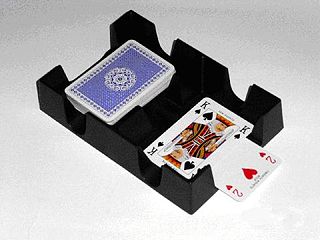
Biriba is the Greek partnership version of a rummy card game of Italian origin called Pinnacola. It is played by two to six players, with two decks and 4 Jokers comprising 108 cards. If 6 players play, one more deck and two jokers more are added. Biriba can also be played by three players with or without partnership rules.
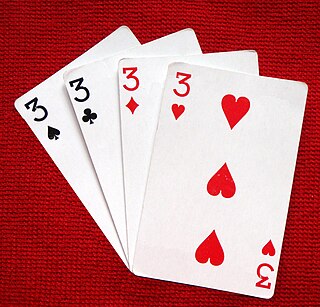
Zheng Shangyou is a Chinese shedding card game similar to President and Big Two. It is the game from which Tien Len and other similar games are derived. It is popular in Shanghai, Zhejiang and Jiangsu.
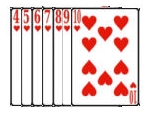
Rumino is a knock rummy card game of Italian origin for up to six people, in which players try to form sets or sequences of cards. It may possibly have been devised in America during the 1940s by Italian immigrants by adapting the game Scala Quaranta to Gin rummy. It is usually played for small stakes Two 52-card decks are used plus four Jokers comprising 108 cards.
Three thirteen is a variation of the card game Rummy. It is an eleven-round game played with two or more players. It requires two decks of cards with the jokers removed. Like other Rummy games, once the hands are dealt, the remainder of the cards are placed face down on the table. The top card from the deck is flipped face up and put beside the deck to start the discard pile.

Continental Rummy is a progressive partnership Rummy card game related to Rumino. It is considered the forerunner of the whole family of rummy games using two packs of cards as one. Its name derives from the fact that it is played throughout the continental Europe, the United States, Mexico, Canada, and also in South America. According to Albert Morehead, it was "at one time the most popular form of Rummy in women's afternoon games, until in 1950 it lost out to Canasta."
Zioncheck is a card game. It is similar to shanghai rummy, contract rummy, or phase 10. Hoyle's book of common card games describes several games as being based upon it, and Contract Rummy is believed to have originated from it.
Buraco is a Rummy-type card game in the Canasta family for four players in fixed partnerships in which the aim is to lay down combinations in groups of cards of equal rank and suit sequences, there being a bonus for combinations of seven cards or more. Buraco is a variation of Canasta which allows both standard melds as well as sequences. It originated from Uruguay and Argentina in the mid-1940s, with apparent characteristics of simplicity and implications that are often unforeseeable and absolutely involving. Its name derives from the Portuguese word "buraco" which means “hole”, applied to the minus score of any of the two partnerships. The game is also popular in the Arab world, specifically in the Persian Gulf; where it is known as 'Baraziliya' (Brazilian). Another popular variation of Buraco is Italian.
Quatorze is a 2+ player card game with origins in Lebanon.









